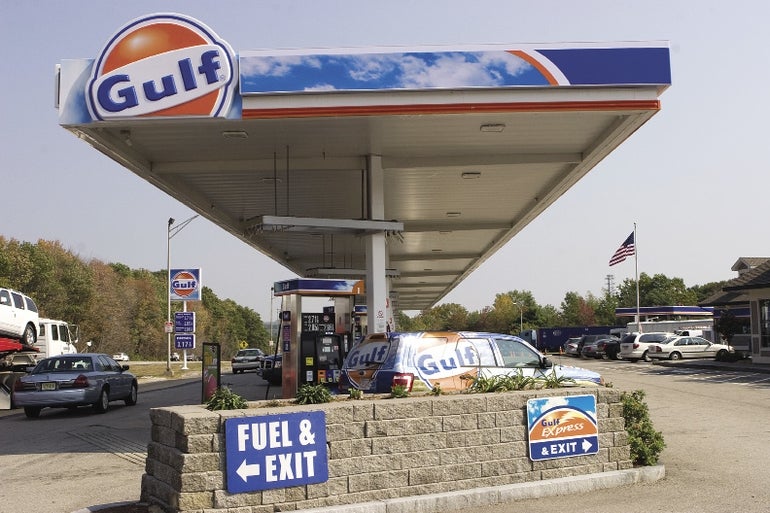Separated Cumberland and Gulf eye revenue growth
The past 10 years have been a time of remarkable growth for Gulf Oil LP, according to the company's chief strategy officer Ron Sabia. But, he says, under new ownership, it has the potential for even greater things.
Gulf Oil, which had been united with Framingham-based Cumberland Farms since 1986, was acquired by a division of Boston private equity firm ArcLight Capital Partners in late December. Sabia said ArcLight's specific focus on energy investments is important for Gulf Oil.
“Through our ownership previously, we had lots of projects on both sides of the company, the retail side of Cumberland Farms and the Gulf side,” he said. “There was not enough capital to do everything we wanted to do on both sides of the company. I think with access to capital and a focus on energy investments, we're going to have a lot more growth opportunities.”
Gulf Oil will be moving to a new leased headquarters in Wellesley in March with 125 employees who now work out of the Cumberland office in Framingham.
Cumberland: Focus on convenience
Meanwhile, the split in the company could also be a boon to Cumberland Farms operations, according to retail analyst Leon Nicholas, a senior vice president of Kantar Retail. Cumberland Farms declined to comment for this story, but Nicholas said it seems clear that being able to focus more closely on the convenience store side of the business may be beneficial.
“In an environment where fuel prices are volatile and unpredictable, they're getting out of that business and into the more profitable business of convenience store operations,” Nicholas said. “That makes a lot of sense.”
The influx of funds from the Gulf Oil sale – whose price was not disclosed but was rumored to be around $1 billion – means more opportunities in the convenience store industry, Nicholas said.
Cumberland opened 27 new stores in 2015 and rebuilt or remodeled 18. Nicholas said the company has done well by revamping its stores, transforming them from gas stations that also sell cigarettes into neighborhood markets with fresh sandwiches, groceries and good coffee.
With low gas prices leaving customers with more money in their pockets, he said, the strategy is to “rely less upon gas. Make gas be the thing that makes you need to go to the convenience story but have Cumberland Farms be the thing that makes you want to go there.”
At the very least, Nicholas said, the company now has plenty of money to keep upgrading its stores, and it could have the capacity to open locations more quickly or even buy up another chain.
According to Cumberland Farms' website, more than 200 of its nearly 600 locations are new concept stores, with freshly prepared foods, shake machines and an array of groceries.
Cumberland Farms has been owned by the Haseotes family since it built its first store in 1962, and its current CEO is Ari Haseotes. It now has locations all over New England and down the East Coast.
In 1986, the company bought the Gulf Oil brand name from Chevron, and in 1993, it joined with Catamount Petroleum to form Gulf Oil LP. Last year, Forbes put the Cumberland Gulf Group's total revenue at $16.5 billion.
Gulf: Revenue opportunities
Gulf Oil now owns and operates 12 storage terminals for refined oil products in the Northeast, and there are more than 2,300 Gulf branded gas stations. The company distributed 3.3 billion gallons of gasoline, heating oil, diesel fuel and other oil products in 2014, according to a statement from ArcLight.
Mark LaCour, the director of Texas oil and gas consultancy Modal Point, said the acquisition could be good for ArcLight because a legal change permitting the export of U.S. crude oil could create more demand for storage terminals. He said another valuable piece of the deal is the Gulf name, which is well known, particularly to older customers.
“Gulf has a lot of brand recognition,” Lacour said.
ArcLight did not return calls for this story.
Under its new ownership, Sabia said, Gulf will now have more potential to make its own acquisitions. It's also likely to find ways to work together with other energy firms under ArcLight ownership, he said.
While the historically low prices of oil are a concern for oil producers, Sabia said they're actually beneficial for a company like Gulf Oil that buys oil products from upstream companies and distributes them through retail and wholesale channels.
“It makes folks more likely to consume, which for us is a good thing,” he said.
Sabia said Gulf Oil has already gone from having branded locations in just 11 Northeastern states in 2005 to 34 states today. Its unbranded sales to private-label distributors and big box stores have more than doubled over the past decade.
Looking to the near future, Sabia said the company's priority will be to expand its operations within its home base in the Northeast.
“We're going to want to grow around the assets of the company,” he said. “We want to win close to home first, where we own terminal assets.”












0 Comments